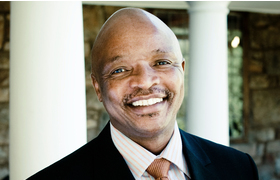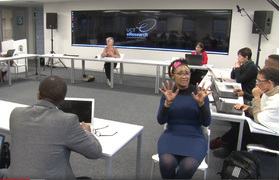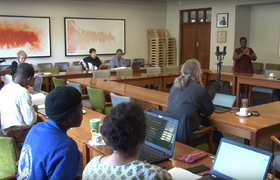Transforming UCT
23 March 2016 | Story by Newsroom
What has UCT done in the last 12 months to create meaningful structural, economic and social change in the institution? In a recent letter to the university (dated 11 March 2016), Vice-Chancellor Dr Max Price reflects on UCT's transformation journey: how far the institution has come and what it is committing to for the rest of 2016.
Below is a summary with links to key highlights.
Prioritising transformation
- UCT's draft strategic plan for 2016–2019 is in the process of being finalised – and transformation is at its core. This plan will guide ongoing and new transformation programmes at the university. Before going to Council in June 2016, the plan will be released for discussion and debate.
- Associate Professor Elelwani Ramugondo was appointed as special advisor to the vice-chancellor on transformation. Read her take on the value of discomfort when talking about transformation.
Appointing new senior leaders
There have been significant changes in UCT's senior leadership in recent months.
- Professor Mamokgethi Phakeng joins UCT on 1 July 2016 as the incoming deputy vice-chancellor for research and internationalisation. She has a passion for young minds and maths education.
- Since the departure of Professor Crain Soudien, who left UCT in 2015 to head up the Human Sciences Research Council, Professor Anwar Mall has been acting as the deputy vice-chancellor for transformation. One of UCT's commitments for 2016 is to find a strong candidate for this permanent post.
- Professor Alison Lewis took over as dean of the Faculty of Engineering & the Built Environment on 1 June 2015.
- Professor Penny Andrews was appointed dean of the Faculty of Law with effect from 1 January 2016.
- Professor Ingrid Woolard started as dean of the Faculty of Commerce on 1 March 2016.
- Professor Bongani Mayosi begins his term as the dean of the Faculty of Health Sciences on 1 September 2016.
- In January 2016 Royston Pillay took up the mantle as UCT's registrar, while Ashley Francis took over as UCT's executive director of finance.
Diversifying the academy
In his letter, Price outlines what he regards at the university's toughest challenge: changing the profile of the professoriate.
What's been done to meet the challenge?
- In 2015 several faculty boards reviewed the people who sat on their academic promotions committees. One faculty changed the profile of their committee before the 2015 round of promotions.
- UCT is researching HR information to see if there's evidence of different criteria being used for the appointment or promotion of academics based on race, and whether there's any bias in decisions around which appointments are extended for staff over the age of 65.
- Thirty-five mid-level and senior academics (all from designated groups) were selected for the Next Generation Professoriate, a programme designed to ensure that candidates are promoted to associate or full professors within five years. This initiative is one aspect of Professor Francis Petersen's Recruitment, Development and Retention (RDR) programme. RDR also includes the New Generation of Academics Programme, which is aimed at recruiting students entering their PhD studies into an academic career.
 Some of the Next Generation Professoriate and their deans at the September 2015 launch.
Some of the Next Generation Professoriate and their deans at the September 2015 launch.
Diversifying the staff body
- All new appointments are guided by UCT's employment equity plan for 2015–2020. This overall plan was based on the individual plans drawn up by faculties and PASS (professional, administrative and support staff) departments, and was then debated and approved by Senate, the Institutional Forum, the University Transformation Advisory Committee and Council during the course of 2015.
- More money has been set aside to allow the university to attract and appoint equity candidates.
- Certain faculties and departments have decided to advertise all positions with the explicit preference that the post should be filled by a black South African.
- All reports submitted by employment equity (EE) representatives on selection committees are being reviewed to see whether reports were submitted and reviewed and whether EE reps raised any concerns about the selection process.
Opening up student access

The new admissions policy was implemented for the first time in 2015 for 2016 student applications. The policy is designed to increase the number of black and disadvantaged students at the university. The registrar's office monitored the 2016 offers made and was satisfied that more offers were going out to black students than in previous years. Analysis of the take-up of offers and the change in social class distribution will be done in the next few months.
Creating safe spaces for critical conversations
In his letter, Price writes about how the most important interventions to improve UCT's institutional climate are conversations. Open spaces where staff and students can talk about how they experience the institution are an opportunity to gain insight “into how we see and treat one another”.
A few examples from the year include:

- The university assembly on 25 March 2015, which was prompted by calls to have the statue of Cecil John Rhodes removed from campus
- Conversations in the Faculty of Humanities, where students made a claim for belonging and staff and students spoke about decolonising UCT
- Ongoing discussions and workshops in the Faculty of Health Sciences
- A Safety and Violence Initiative seminar on struggling with the past, making sense of the present and imagining the future
“For me, this is what the university is about. It's about playing with the way you think about things and the way you relate to the world, and through this playfulness, really coming to new ways of being … I think we can all agree that the status quo is not working. If we expect students to just come to class and regurgitate what they are being taught, it's bound to perpetuate the status quo.” Thuto Thipe
- An alumni roadshow on transformation
- The HIV/AIDS Inclusivity & Change Unit (HAICU) has facilitated 60 inclusivity workshops for roughly 4 000 first-year students in all faculties and residences, as well as for mentors and facilitators in student support programmes. These workshops focus on educating and sensitising new and returning students to issues of gender-based violence, patriarchy, sexual orientation, HIV, human rights and social justice.
(UCT's website also includes an overview of some of these discussions, from Rhodes Must Fall to Fees Must Fall and beyond.)
Reforming the curriculum
- A group has been established to coordinate a broader review of
- the relevance of UCT curricula for the South African and African contexts
- opportunities for greater breadth in undergraduate curricula
- research and service-learning opportunities for students to engage more with key challenges facing the continent.
An example of curriculum reform in action is an undergraduate African studies major, which is set to launch in the Faculty of Humanities in 2017.
- Following a recent Senate decision, UCT will also start recognising students' contributions beyond the classroom – their volunteer service, leadership and other non-curricular learning activities – on academic transcripts.
Relooking UCT's heritage, culture, signs and symbols

- 2015 will be remembered as the year the statue of Rhodes was removed from campus. But there were other important markers during the year, particularly the renaming of the Arts Block and the Graduate School of Humanities – now the AC Jordan and Neville Alexander buildings respectively.
“I am going to UCT to open that door and keep it ajar, so that our people too can come in. UCT on African soil belongs to us too. UCT can and never will be a true university until it admits us too, the children of the soil. I am going there to open that door and keep it ajar.” AC Jordan
- Looking forward, a task team of six (including three SRC-nominated student members) has completed an audit of building names and will tackle the question of Jameson Hall and four other buildings whose names have been questioned.
- Another task team has produced an inventory of commemorative plaques, sculptures, statues and art on campus and has identified a number of works in public spaces that are particularly controversial. This team will be developing a policy on the future acquisition, display and curation of art (keeping in mind the collective impact of works on display).
- The university has also started to infuse more of an African identity into its graduation ceremonies. In December 2015's graduation season, Gaudeamus igitur was replaced by Abdullah Ibrahim's Mannenberg and an imbongi praised new graduates. Read more.

Reviewing UCT governance and support structures
- A sexuality and gender policy has been drafted and is being discussed.
- UCT acknowledges the need to move away from the assumption of binary gender classification and recognises the right of individuals to self-classify. A working group is examining the implications of all administrative systems moving away from binary gender classification.
- Professor Rashida Manjoo has reviewed all sexual assault cases that came before the student disciplinary tribunal in the last five years. She found the sentencing was generally appropriate. However, one recent sentence was considered too lenient and the university has initiated an appeal to increase this sentence.
- A review of the Discrimination and Harassment Office (DISCHO) has been completed and recommendations are being considered. In the meantime, a Sexual Assault Response Team (SART) is being established and will be headed by Associate Professor Sinegugu Duma.
- In addition to the DISCHO review, reviews of the Institutional Forum and Transformation Services Office have just been submitted for consideration.
- A transformation dialogue forum was created in June 2015. Represented on this forum are student movements and representative structures, academics, deans, heads of department, PASS staff, the Black Academic Caucus, the Institutional Forum, trade unions and management. While the forum has struggled to get going, it is expected to gather in the next month to review UCT's draft strategic plan.

Insourcing UCT workers
Perhaps one of the most significant transformation interventions in 2015 was the decision to insource the workers and services currently provided by six contracting companies (security, catering, two cleaning services, gardening and the UCT transport service – the Jammie Shuttle).
“Next year we'll be colleagues!”
Read more about the historic insourcing decision.
Transformation plans for 2016
UCT's draft strategic plan for 2016–2019 will soon be released for discussion and debate. In the meantime, below is a list of the university's plans for the year ahead:
- Implement recommendations regarding the transformation office
- Appoint a deputy vice-chancellor for transformation
- Accelerate the work of the task teams on names of buildings and works of art
- Reimagine graduation ceremonies
- Continue to focus on employment equity (with emphasis on recruitment, analysing obstacles to promotion, and finding more concrete mechanisms of accountability for deans and heads of department)
- Assess the climate within departments (in part through 360° surveys of managers)
- Implement a new training programme for employment equity representatives and selection committee chairs
- Ensure that faculties and departments hold regular transformation forums
- Strengthen the Next Generation Professoriate and Recruitment, Development and Retention programmes
- Review the academic promotions criteria
- Review the admissions policy (based on analysis of the 2016 first-year student body, to whom this policy applied)
- Strengthen mental health services in Student Wellness Services, particularly with the addition of black therapists, and consider alternative healing methods
- Move Disability Services to a more accessible venue (if possible) and investigate challenges presented by the disability lobby
- Increase the number of gender-neutral toilets
- Relook administration systems, public statements and positions around LGBTQIA+ issues
- Consider the possibility of targeted awareness campaigns around LGBTQIA+ issues in residences
- Review UCT's residence allocation policy
- Seek private and public funding to build at least one more residence.

 This work is licensed under a Creative Commons Attribution-NoDerivatives 4.0 International License.
This work is licensed under a Creative Commons Attribution-NoDerivatives 4.0 International License.
Please view the republishing articles page for more information.

















